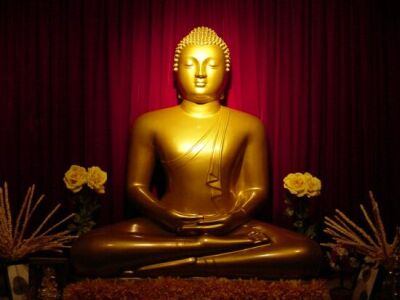
THE DHAMMA

![]()
Thus have I heard. Once the Blessed One, while wandering in the Kosala country with a large community of bhikkhus, entered a town of the Kalama people called Kesaputta. The Kalamas who were inhabitants of Kesaputta: "Reverend Gotama, the monk, the son of the Sakyans, has, while wandering in the Kosala country, entered Kesaputta. The good repute of the Reverend Gotama has been spread in this way: Indeed, the Blessed One is thus consummate, fully enlightened, endowed with knowledge and practice, sublime, knower of the worlds, peerless, guide of tamable men, teacher of divine and human beings, which he by himself has through direct knowledge understood clearly. He set forth the Dhamma, good in the beginning, good in the middle, good in the end, possessed of meaning and the letter, and complete in everything; and he proclaims the holy life that is perfectly pure. Seeing such consummate ones is good indeed."
Then the Kalamas who were inhabitants of Kesaputta went to where the Blessed One was. On arriving there some paid homage to him and sat down on one side; some exchanged greetings with him and after the ending of cordial memorable talk, sat down on one side; some saluted him raising their joined palms and sat down on one side; some announced their name and family and sat down on one side; some without speaking, sat down on one side.
The Kalamas who were inhabitants of Kesaputta sitting on one side said to the Blessed One: "There are some monks and brahmins, venerable sir, who visit Kesaputta. They expound and explain only their own doctrines; the doctrines of others they despise, revile, and pull to pieces. Some other monks and brahmins too, venerable sir, come to Kesaputta. They also expound and explain only their own doctrines; the doctrines of others they despise, revile, and pull to pieces. Venerable sir, there is doubt, there is uncertainty in us concerning them. Which of these reverend monks and brahmins spoke the truth and which falsehood?"
"It is proper for you, Kalamas, to doubt, to be uncertain; uncertainty has arisen in you about what is doubtful. Come, Kalamas. Do not go upon what has been acquired by repeated hearing; nor upon tradition; nor upon rumor; nor upon what is in a scripture; nor upon surmise; nor upon an axiom; nor upon specious reasoning; nor upon a bias towards a notion that has been pondered over; nor upon another's seeming ability; nor upon the consideration, 'The monk is our teacher.' Kalamas, when you yourselves know: 'These things are bad; these things are blamable; these things are censured by the wise; undertaken and observed, these things lead to harm and ill,' abandon them".